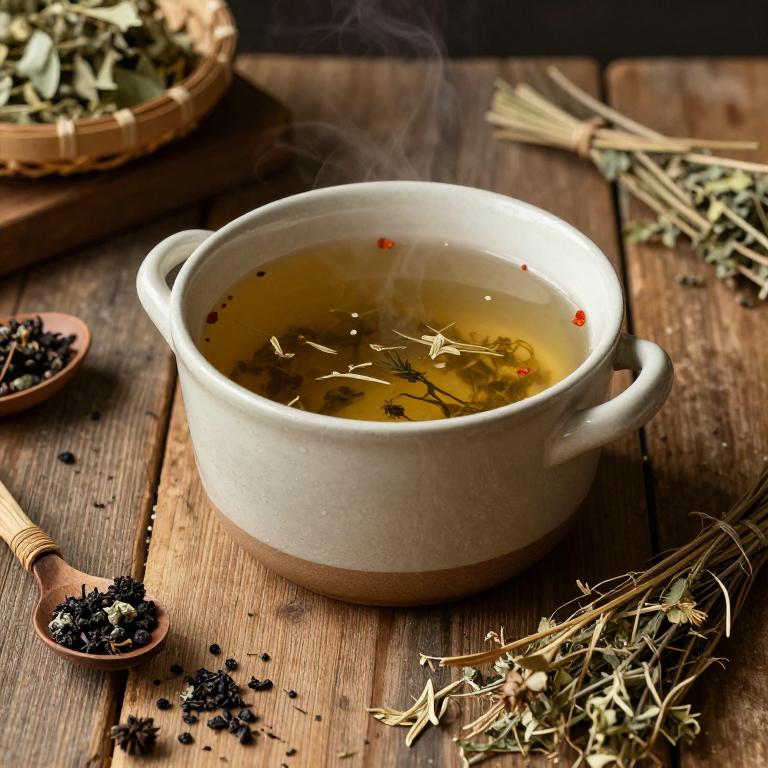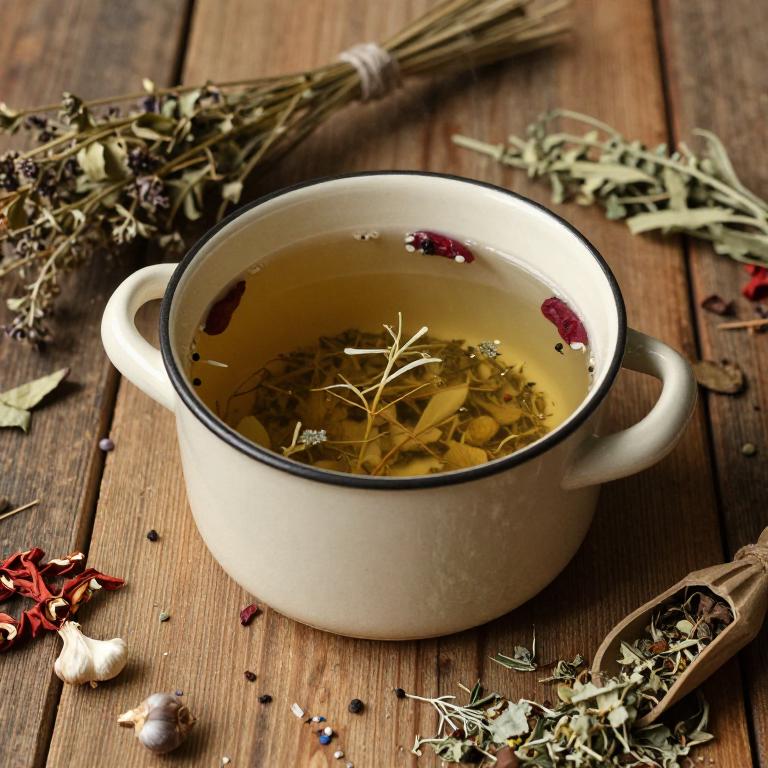10 Best Herbal Decoctions For Throat Irritation

Herbal decoctions have been traditionally used to alleviate throat irritation due to their soothing and anti-inflammatory properties.
Commonly used herbs include licorice root, thyme, and echinacea, which can help reduce swelling and ease discomfort. To prepare a decoction, these herbs are typically simmered in water for an extended period to extract their active compounds. This method allows for the gentle release of beneficial compounds that can be easily absorbed by the body.
Regular consumption of herbal decoctions may provide natural relief for mild throat irritation and support overall respiratory health.
Table of Contents
- 1. Licorice (Glycyrrhiza glabra)
- 2. Ginger (Zingiber officinale)
- 3. Thyme (Thymus vulgaris)
- 4. Black elderberry (Sambucus nigra)
- 5. Salvia (Salvia officinalis)
- 6. Fennel (Foeniculum vulgare)
- 7. Stinging nettle (Urtica dioica)
- 8. Echinacea (Echinacea purpurea)
- 9. Peppermint (Mentha piperita)
- 10. Chamomile (Matricaria chamomilla)
1. Licorice (Glycyrrhiza glabra)

Glycyrrhiza glabra, commonly known as licorice root, has been traditionally used in herbal medicine for its soothing properties, particularly for throat irritation.
The preparation of licorice root decoctions involves simmering the dried root in water to extract its active compounds, such as glycyrrhizin and flavonoids, which have anti-inflammatory and antioxidant effects. These decoctions can help reduce inflammation, ease coughing, and relieve soreness in the throat, making them a popular remedy for conditions like sore throat and laryngitis. The sweet taste of licorice root also enhances the palatability of the decoction, encouraging regular use.
However, prolonged use of licorice root decoctions may lead to side effects such as hypertension, so it is advisable to consult a healthcare professional before long-term use.
2. Ginger (Zingiber officinale)

Zingiber officinale, commonly known as ginger, has been widely used in traditional medicine for its soothing properties, particularly for alleviating throat irritation.
Herbal decoctions made from fresh or dried ginger root are prepared by boiling the rhizome in water, allowing the active compounds such as gingerols and shogaols to infuse into the liquid. These decoctions are valued for their anti-inflammatory, antiviral, and analgesic effects, which can help reduce swelling, ease pain, and combat infections in the throat. Consuming ginger tea or using it as a gargle can provide rapid relief for sore throats and coughs.
Due to its natural and generally safe profile, ginger decoctions are often recommended as a complementary therapy for mild to moderate throat irritation.
3. Thyme (Thymus vulgaris)

Thymus vulgaris, commonly known as thyme, is a popular herb used in herbal medicine for its soothing properties, particularly for throat irritation.
Its herbal decoctions are prepared by boiling the dried leaves and flowers in water to extract the essential oils and active compounds. Thyme contains thymol, a potent antiseptic and anti-inflammatory agent that helps reduce throat inflammation and combat bacterial infections. The warm, aromatic decoction is often recommended for alleviating symptoms such as sore throat, cough, and hoarseness.
Regular consumption of thyme decoctions can provide natural relief and support the body's immune response against respiratory ailments.
4. Black elderberry (Sambucus nigra)

Sambucus nigra, commonly known as European elderberry, has been traditionally used in herbal medicine for its potential soothing properties on the throat.
Herbal decoctions made from the berries, flowers, or leaves of Sambucus nigra are often prepared by simmering the plant material in water to extract its active compounds. These decoctions are believed to possess anti-inflammatory and antioxidant properties that may help alleviate symptoms of throat irritation, such as soreness and inflammation. Some studies suggest that the presence of flavonoids and other bioactive compounds in elderberry may contribute to its therapeutic effects.
However, it is important to use Sambucus nigra preparations cautiously, as raw berries and certain parts of the plant can be toxic if not properly prepared.
5. Salvia (Salvia officinalis)

Salvia officinalis, commonly known as sage, has been traditionally used for its soothing properties in herbal decoctions for throat irritation.
When prepared as a decoction, sage leaves are simmered in water to extract their medicinal compounds, including essential oils and flavonoids, which possess anti-inflammatory and antimicrobial effects. This herbal remedy is often recommended for alleviating symptoms such as sore throat, coughing, and excessive mucus production. The mild antiseptic properties of sage can help reduce bacterial infections in the throat, making it a natural alternative to conventional treatments.
However, it is important to use sage decoctions in moderation and consult a healthcare professional, especially for prolonged or severe throat conditions.
6. Fennel (Foeniculum vulgare)

Foeniculum vulgare, commonly known as fennel, has been traditionally used in herbal medicine for its soothing properties, particularly in alleviating throat irritation.
A decoction made from the seeds of fennel is often prepared by simmering them in water for several minutes to extract their essential oils and active compounds. This herbal remedy is believed to help reduce inflammation and ease coughing due to its mild antispasmodic and expectorant effects. The volatile oils in fennel, such as anethol, contribute to its ability to soothe mucous membranes and provide relief from sore throats.
While generally considered safe, it is advisable to consult a healthcare professional before using fennel decoctions, especially for prolonged or severe throat conditions.
7. Stinging nettle (Urtica dioica)

Urtica dioica, commonly known as stinging nettle, has been traditionally used in herbal medicine for its anti-inflammatory and soothing properties.
A decoction made from the leaves and stems of Urtica dioica can be prepared by boiling the dried plant material in water for several minutes. This herbal decoction is often used to alleviate throat irritation due to its high content of minerals and antioxidants. The mild antiseptic and demulcent qualities of the decoction help reduce inflammation and soothe sore throats.
However, it is important to consult a healthcare professional before using it, especially for individuals with allergies or existing medical conditions.
8. Echinacea (Echinacea purpurea)

Echinacea purpurea, commonly known as purple coneflower, is a popular herbal remedy used to alleviate throat irritation due to its anti-inflammatory and immune-boosting properties.
Herbal decoctions made from echinacea roots and leaves are often prepared by simmering the dried plant material in water to extract its active compounds. These decoctions may help reduce inflammation and soothe sore throats by inhibiting the growth of bacteria and viruses that commonly cause throat infections. However, it is important to consult a healthcare professional before using echinacea, as it may interact with certain medications or cause allergic reactions in some individuals.
Overall, echinacea purpurea decoctions offer a natural approach to managing throat irritation, though their effectiveness can vary depending on the individual and the specific condition being treated.
9. Peppermint (Mentha piperita)

Mentha piperita, commonly known as peppermint, is often used in herbal decoctions to alleviate throat irritation due to its soothing and anti-inflammatory properties.
A peppermint herbal decoction is prepared by steeping fresh or dried leaves in hot water, creating a calming infusion that can be consumed several times a day. This remedy helps to reduce inflammation, ease coughing, and provide a cooling effect that soothes the throat lining. The menthol content in peppermint has a mild anesthetic effect, which can temporarily numb the throat and reduce discomfort.
While generally safe for most people, it is advisable to consult a healthcare provider before using peppermint decoctions, especially for those with certain medical conditions or who are taking medications.
10. Chamomile (Matricaria chamomilla)

Matricaria chamomilla, commonly known as chamomile, has been widely used in traditional medicine for its soothing properties.
Herbal decoctions made from dried chamomile flowers are often prepared by steeping the flowers in hot water, creating a calming tea that can be used to alleviate throat irritation. The active compounds in chamomile, such as flavonoids and essential oils, possess anti-inflammatory and antiseptic qualities that help reduce swelling and combat bacterial infections in the throat. This natural remedy is particularly effective for soothing sore throats caused by colds, allergies, or minor infections.
When consumed warm, chamomile decoctions can provide relief and promote overall throat comfort.